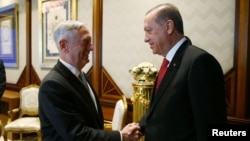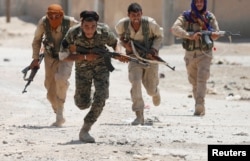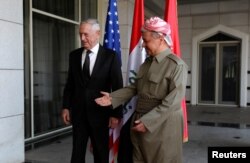U.S. Defense Secretary Jim Mattis met with senior Turkish officials Wednesday in Ankara for talks on regional stability and security issues amid Turkey's uneasiness with Washington's arming of a Syrian Kurdish militia which Turkey considers a terrorist organization. On his one-day visit, Mattis met with President Recep Tayyip Erdogan after talks with Defense Minister Nurettin Canikli. Turkish intelligence chief Hakan Fidan also took part in the meeting with the Turkish leader.
Washington has been stepping up its military support for the Kurdish People's Protection Units, or YPG, which is fighting to capture the Syrian city of Raqqa, Islamic State’s self-declared capital. Ankara accuses the YPG of being an offshoot of the Kurdish rebel group PKK, which has been waging a decades-long insurgency in Turkey. The United States and Turkey have listed the PKK as a terrorist organization. Washington, however, has not done so in the case of the YPG.
Impressed by the YPG's success in fighting Islamic State, Washington has been supplying the YPG with armored vehicles and small arms since May. The YPG has captured large swaths of territory from the jihadists, much of it along the Turkish border, unnerving Ankara, which fears the YPG will further fuel secessionist demands from Turkey's restive Kurdish minority.
Erdogan has repeatedly threatened to intervene militarily in Syria to thwart any threat posed by the YPG. "Whatever the price, we will conduct the necessary intervention,” Erdogan said Tuesday during a meeting at the presidential palace. Turkish forces have massed on the border facing the Syrian enclave of Afrin, which is under YPG control. The YPG has warned any attack would affect its ongoing assault on Raqqa.
“Afrin is just immediately on the border of Turkey and Turkey will not allow any kind of formation which will be an autonomous region or some kind of controlled area under the control of Syrian Kurds. Turkey considers this as a major security issue,” said former Turkish ambassador Unal Cevikoz, who now heads the Ankara Policy Center. “But I don't think there will be any agreement between the United States and Turkey, and I think the sides will have to agree to disagree."
Local Turkish media reports, citing unnamed sources, said the U.S. defense secretary, in his meetings in Ankara, emphasized the importance of maintaining the territorial integrity of Syria and Iraq. In a bid to assuage Turkish concerns, Washington reaffirmed its commitment to offer assistance to fighting the PKK.
KRG referendum
The two NATO allies have found common ground over concerns about an independence referendum next month by the semi-autonomous Iraqi Kurdish regional government. Mattis was reported during his meeting with KRG President Masoud Barzani Tuesday to have asked for a postponement of the vote. “Right now, our focus is on defeating IS inside Iraq, restoring Iraqi sovereignty and territorial integrity,” the defense secretary said ahead of a visit to Iraq. Mattis described his meeting with Barzani as an "honest discussion between two friends.”
Ankara is looking to Washington to use its leverage over Iraqi Kurdish leadership to at least postpone the vote. The Turkish foreign minister, Mevlut Cavusoglu, Wednesday reiterated opposition to the vote during a visit to Baghdad. ”We have informed them that their decision is wrong…. Our expectation is clear and simple. This referendum decision should be canceled," he said.
Local media, citing diplomatic sources, said Ankara’s planned purchase of a multi-billion-dollar Russian surface-to-air missile system was also a topic of discussion during Mattis' talks. Mattis has recently voiced concern over the purchase, warning of its incompatibility with NATO systems.
The planned missile purchase is adding to concerns over Ankara’s commitment to NATO and allegiances to its Western allies. General Valery Gerasimov, head of the Russian armed forces, is due in Ankara later this week for talks. The visit follows one by Iranian armed forces chief Hossein Bagheri's whose trip to Turkey marked the first of its kind since the 1979 Iranian revolution. Erdogan indicated Monday Iran and Turkey could carry out a joint military operation against the PKK. The Iranian Revolutionary Guard denied the claim.
Mattis' stop in Turkey was part of a regional tour that included Jordan. The U.S. defense secretary is also scheduled to stop in Ukraine.






